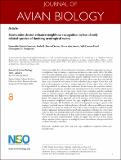Duet codes do not enhance neighbour recognition in two closely related species of duetting neotropical wrens
Abstract
Numerous studies have shown that territorial animals exhibit less aggression in response to neighbours than to strangers, a phenomenon known as dear enemy effect. The influence of acoustic features, such as song type sharing and repertoire sizes, in neighbour recognition has been widely documented in male songbirds. However, few studies have focused on duetting species, and particularly on those where pairs have pair‐specific duet codes (consistent associations of their individual phrase types). Given that each pair in the population can have a unique repertoire of duet types, duet codes have been hypothesized to enhance discrimination. In this context, we tested for evidence of neighbour recognition and duet code discrimination in two closely related species of neotropical wrens, the riverside wren, Cantorchilus semibadius, and the canebrake wren, C. modestus zeledoni. Although both species have moderately large repertoires, riverside wrens have higher levels of phrase type and duet type sharing across the population. We compared the approach and vocal responses of focal pairs to three playback treatments: neighbours' correct duet type, neighbours' incorrect duet type and a strangers' duet type. We found that riverside wrens displayed a stronger response to the strangers' playback than to both neighbours' playbacks, whereas no differences among treatments were found in canebrake wrens. Given that both species exhibited similar levels of aggression during neighbour playbacks, regardless of whether the correct duet code was used, our findings suggest duet codes do not facilitate neighbour recognition. We conclude that the function of duet codes in these species might be more closely related to intra‐pair communication. Finally, we suggest that the level of dear enemy effect a species exhibits depends on ecological factors that influence the perceived level of threat of territory intruders.
Citation
Quiros Guerrero , E , Rivera-Cáceres , K , Janeiro Silva , M J , Cresswell , W & Templeton , C N 2021 , ' Duet codes do not enhance neighbour recognition in two closely related species of duetting neotropical wrens ' , Journal of Avian Biology , vol. 52 , no. 1 , 02615 . https://doi.org/10.1111/jav.02615
Publication
Journal of Avian Biology
Status
Peer reviewed
ISSN
0908-8857Type
Journal article
Description
Funding: First author was supported by a PhD scholarship (381393/327118) funded by the Consejo Nacional de Ciencia y Tecnología (CONACYT). This research was funded by grants and fellowships from NERC (NE/J018694/1), the Royal Society (RG2012R2), and MJ Murdock Charitable Trust (2014199).Collections
Items in the St Andrews Research Repository are protected by copyright, with all rights reserved, unless otherwise indicated.

